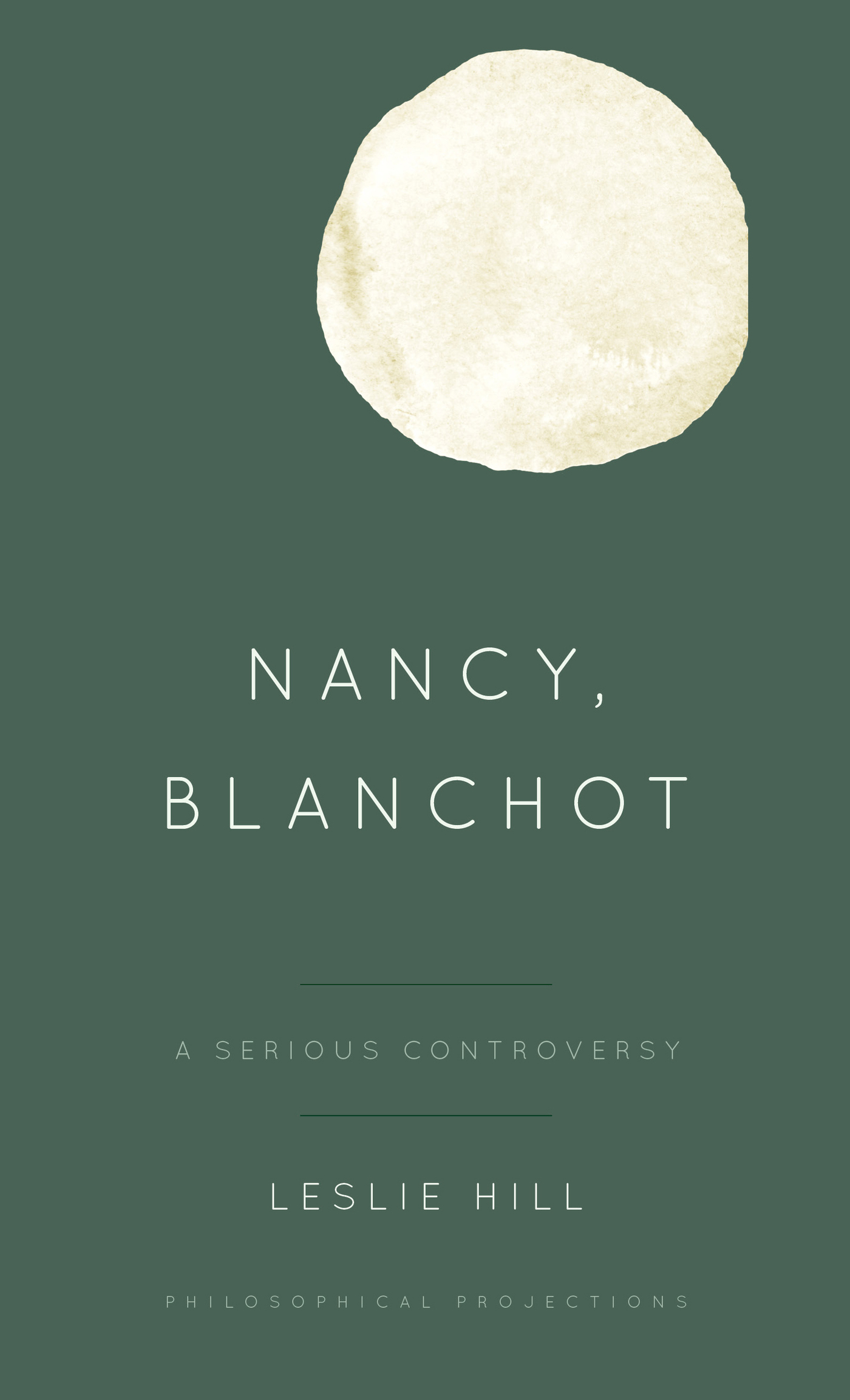Nancy, Blanchot
Philosophical Projections
Series Editor: Andrew Benjamin, Distinguished Professor of Philosophy and the Humanities, Kingston University, UK, and Professor of Philosophy and Jewish Thought, Monash University, Australia
Philosophical Projections represents the future of Modern European Philosophy. The series seeks to innovate by grounding the future in the work of the present, opening up the philosophical and allowing it to renew itself, while interrogating the continuity of the philosophical after the critique of metaphysics.
Titles in the Series
Foundations of the Everyday: Shock, Deferral, Repetition, Eran Dorfman
The Thought of Matter: Materialism, Conceptuality and the Transcendence of Immanence, Richard A. Lee
Nancy, Blanchot: A Serious Controversy, Leslie Hill
Nancy, Blanchot
A Serious Controversy
Leslie Hill

London New York
Published by Rowman & Littlefield International, Ltd.
Unit A, Whitacre Mews, 26-34 Stannary Street, London SE11 4AB
www.rowmaninternational.com
Rowman & Littlefield International, Ltd., is an affiliate of
Rowman & Littlefield
4501 Forbes Boulevard, Suite 200, Lanham, Maryland 20706, USA
With additional offices in Boulder, New York, Toronto (Canada), and London (UK)
www.rowman.com
Copyright 2018 by Leslie Hill
All rights reserved. No part of this book may be reproduced in any form or by any electronic or mechanical means, including information storage and retrieval systems, without written permission from the publisher, except by a reviewer who may quote passages in a review.
British Library Cataloguing in Publication Information
A catalogue record for this book is available from the British Library
ISBN: HB 978-1-78660-887-1
ISBN: PB 978-1-78660-888-8
Library of Congress Cataloging-in-Publication Data Is Available
ISBN 978-1-78660-887-1 (cloth: alk. paper)
ISBN 978-1-78660-888-8 (pbk: alk. paper)
ISBN 978-1-78660-889-5 (electronic)
 TM The paper used in this publication meets the minimum requirements of American National Standard for Information Sciences Permanence of Paper for Printed Library Materials, ANSI/NISO Z39.48-1992.
TM The paper used in this publication meets the minimum requirements of American National Standard for Information Sciences Permanence of Paper for Printed Library Materials, ANSI/NISO Z39.48-1992.
Printed in the United States of America
Acknowledgements
I should like here to record my thanks to all those who first prompted, then encouraged me to write this book, and in diverse ways assisted me in completing it: Philip Armstrong, Andrew Benjamin, Christophe Bident, Jonathan Degenve, Mauro Di Lullo, Chris Elwell, Christopher Fynsk, Tania Ganitsky, Kevin Hart, Andrew Hass, Sabine Kaufman, Holly Langstaff, Ian Maclachlan, Jrmie Majorel, Parham Shahrjerdi, and Daniel Wilhem, not forgetting the staff at Warwick University Library, Cambridge University Library, and the Bibliothque nationale de France, and, in particular, Jean-Luc Nancy who on several occasions graciously gave of his time to exchange views on Blanchots work and his own thinking. I am grateful too for the support and forbearance of Juliet Hill, Susie Hill, and Mig Kerr. It goes without saying that responsibility for the arguments presented in the book is mine and mine alone. Unless otherwise indicated, all translations are my own.
Permissions
Extracts from The Unavowable Community reprinted by permission from The Unavowable Community by Maurice Blanchot, translated by Pierre Joris, Station Hill Press, 1988. English translation copyright 1988 by Station Hill Press. Originally published in French as La Communaut inavouable, copyright 1983 by Editions de Minuit.
Extracts from The Inoperative Community reprinted by permission from The Inoperative Community by Jean-Luc Nancy, edited and translated by Peter Connor, The University of Minnesota Press, 1991. English translation copyright 1991 by the Regents of the University of Minnesota. Originally published in French as La Communaut dsuvre, copyright 1986 by Christian Bourgois Editeur.
Extracts from The Infinite Conversation reprinted by permission from The Infinite Conversation by Maurice Blanchot, translated by Susan Hanson, The University of Minnesota Press, 1993. English translation copyright 1993 by the Regents of the University of Minnesota. Originally published in French as LEntretien infini, copyright 1969 by Editions Gallimard.
Extracts from The Disavowed Community reprinted by permission from The Disavowed Community by Jean-Luc Nancy, translated by Philip Armstrong, Fordham University Press, 2016. English translation copyright 2016 by Fordham University Press. Originally published in French as La Communaut dsavoue, copyright 2014 by Editions Galile.
Chapter 1
Community and Its Discontents
During the last thirty-five or so years, within a certain everyday social, political, or at times philosophical and literary discourse, few expressions, it would seem, have been so frequently used or abused, now as proof of an urgent historical challenge, now as an expression of pious, sentimental nostalgia, as the word community. Its currency is in any case arguably only one of many symptoms of that enduring crisis of the political with which all aspects of life in the Western world (and elsewhere) are increasingly synonymous and which events in recent decades, in Europe, the United States, and other countries, have made more acute than ever. The meaning or meanings of community are admittedly not simple. Over time they have travelled back and forth between the religious and the secular, the military and the civil, the economic and the ethical; they have migrated from notions of national, regional, or linguistic affiliation to assumptions regarding ethnic, confessional, or sexual identification, not to mention the dismal servitude associated with consumer branding. They have at times been used to promote reactionary nationalisms, while at others they have been enlisted to support radically different aspirations; and they have been routinely applied to feelings and opinions, property and interests, rights and liabilities, with the consequence that each of these complex, differentiated, intensely contested registers finds itself facing the threat of being submerged or overtaken by any one or more of its fellows. Today, as a result, it is sometimes hard to resist the conclusion that the concept of community, in its inflation or its poverty, raises many more questions than it provides answers, and increasingly functions as a kind of all-purpose vehicle for the thwarted yearnings and seductive compensations of its own history, merely a sign, so to speak, of an unfulfilled, even fantasmatic exigency, all of which renders its value, and the values it promotes, arguably more contradictory and more compromised than ever.
But are there truly concepts, asked Maurice Blanchot, novelist, literary critic, and sometime political activist, in La Communaut inavouable (The Unavowable Community), disaster or disaster, meaning the exigency of dispersion together with the dispersion of exigency, that is, anything but the mute acceptance of catastrophe, more a recognition of the radical impossibility, both vacancy and resistance, encountered at the core of possibility itself, and inseparable from a redoubled injunction to think again, to think anew, and to think otherwise.

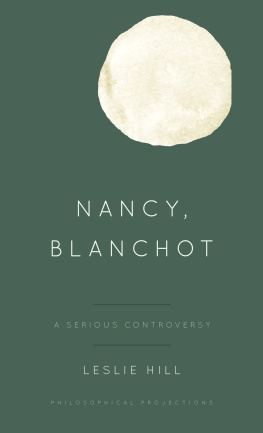




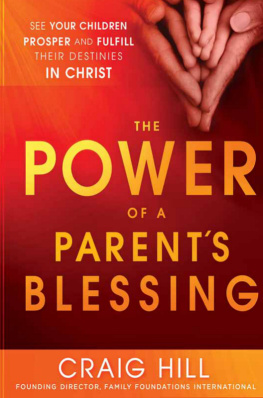

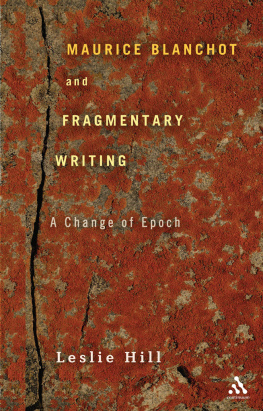

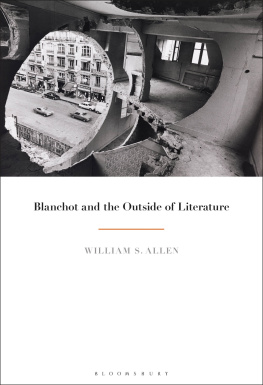

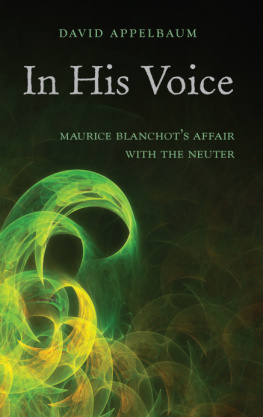
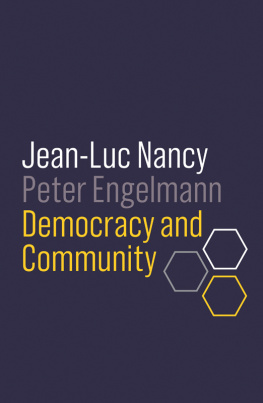
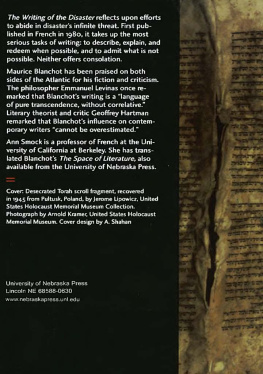
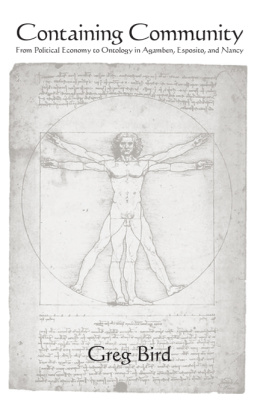
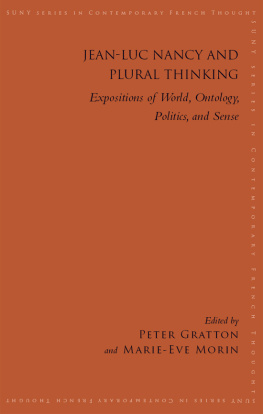
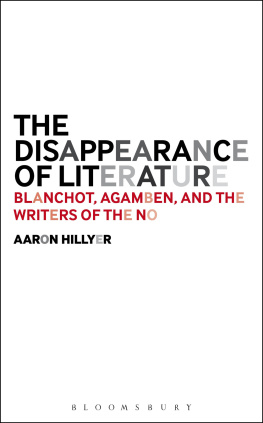

 TM The paper used in this publication meets the minimum requirements of American National Standard for Information Sciences Permanence of Paper for Printed Library Materials, ANSI/NISO Z39.48-1992.
TM The paper used in this publication meets the minimum requirements of American National Standard for Information Sciences Permanence of Paper for Printed Library Materials, ANSI/NISO Z39.48-1992.